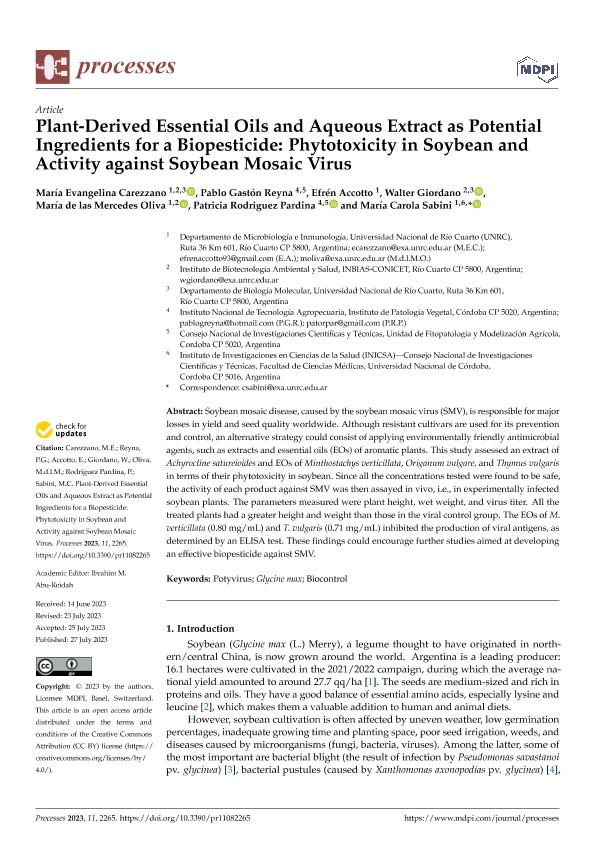Artículo
Plant-Derived Essential Oils and Aqueous Extract as Potential Ingredients for a Biopesticide: Phytotoxicity in Soybean and Activity against Soybean Mosaic Virus
Carezzano, Maria Evangelina ; Reyna, Pablo Gastón
; Reyna, Pablo Gastón ; Accotto, Efrén; Giordano, Walter Fabian
; Accotto, Efrén; Giordano, Walter Fabian ; Oliva, Maria de Las Mercedes
; Oliva, Maria de Las Mercedes ; Rodríguez-Pardina, Patricia Elsa; Sabini, Maria Carola
; Rodríguez-Pardina, Patricia Elsa; Sabini, Maria Carola
 ; Reyna, Pablo Gastón
; Reyna, Pablo Gastón ; Accotto, Efrén; Giordano, Walter Fabian
; Accotto, Efrén; Giordano, Walter Fabian ; Oliva, Maria de Las Mercedes
; Oliva, Maria de Las Mercedes ; Rodríguez-Pardina, Patricia Elsa; Sabini, Maria Carola
; Rodríguez-Pardina, Patricia Elsa; Sabini, Maria Carola
Fecha de publicación:
07/2023
Editorial:
Multidisciplinary Digital Publishing Institute
Revista:
Processes
ISSN:
2227-9717
Idioma:
Inglés
Tipo de recurso:
Artículo publicado
Clasificación temática:
Resumen
Soybean mosaic disease, caused by the soybean mosaic virus (SMV), is responsible for major losses in yield and seed quality worldwide. Although resistant cultivars are used for its prevention and control, an alternative strategy could consist of applying environmentally friendly antimicrobial agents, such as extracts and essential oils (EOs) of aromatic plants. This study assessed an extract of Achyrocline satureioides and EOs of Minthostachys verticillata, Origanum vulgare, and Thymus vulgaris in terms of their phytotoxicity in soybean. Since all the concentrations tested were found to be safe, the activity of each product against SMV was then assayed in vivo, i.e., in experimentally infected soybean plants. The parameters measured were plant height, wet weight, and virus titer. All the treated plants had a greater height and weight than those in the viral control group. The EOs of M. verticillata (0.80 mg/mL) and T. vulgaris (0.71 mg/mL) inhibited the production of viral antigens, as determined by an ELISA test. These findings could encourage further studies aimed at developing an effective biopesticide against SMV.
Palabras clave:
BIOCONTROL
,
GLYCINE MAX
,
POTYVIRUS
Archivos asociados
Licencia
Identificadores
Colecciones
Articulos (INBIAS)
Articulos de INSTITUTO DE BIOTECNOLOGIA AMBIENTAL Y SALUD
Articulos de INSTITUTO DE BIOTECNOLOGIA AMBIENTAL Y SALUD
Articulos(INICSA)
Articulos de INSTITUTO DE INVESTIGACIONES EN CIENCIAS DE LA SALUD
Articulos de INSTITUTO DE INVESTIGACIONES EN CIENCIAS DE LA SALUD
Citación
Carezzano, Maria Evangelina; Reyna, Pablo Gastón; Accotto, Efrén; Giordano, Walter Fabian; Oliva, Maria de Las Mercedes; et al.; Plant-Derived Essential Oils and Aqueous Extract as Potential Ingredients for a Biopesticide: Phytotoxicity in Soybean and Activity against Soybean Mosaic Virus; Multidisciplinary Digital Publishing Institute; Processes; 11; 8; 7-2023; 1-16
Compartir
Altmétricas



